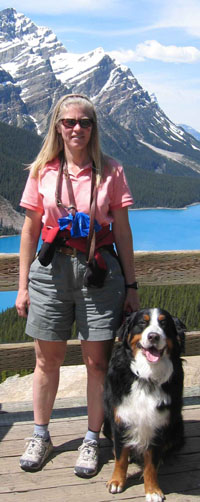Bridget Gourley
 Professor Gourley, Professor of Chemistry and Biochemistry, received her Bachelors degrees in Chemistry and Mathematics from the University of Puget Sound and her Ph.D. in Physical Chemistry from the University of Utah. Immediately after defending her Ph.D. dissertation she joined the faculty in the Department of Chemistry at DePauw University. Her Ph.D. is in the area of laser-molecule interactions.
Professor Gourley, Professor of Chemistry and Biochemistry, received her Bachelors degrees in Chemistry and Mathematics from the University of Puget Sound and her Ph.D. in Physical Chemistry from the University of Utah. Immediately after defending her Ph.D. dissertation she joined the faculty in the Department of Chemistry at DePauw University. Her Ph.D. is in the area of laser-molecule interactions.
Since coming to DePauw, Professor Gourley has stayed active in the field of laser-molecule interactions. Sabbaticals during AY2004-05 and AY 2009-10 in ultrafast laser spectroscopy on reverse micelles led her to add a wet laboratory component to her research. Currently her students are working with her on the spectroscopy of reverse micelles, both steady-state and time resolved spectroscopies. The overarching research questions relate to a to better understanding of the behavior of water in confined systems. Other students are developing a library of different sized gold nanoparticles with biomolecules attached as part of a collaboration to build an optical biosensor. In the past she collaborated with another WS and science colleague, Jeanette Pope, and several students looking at acid-mine drainage. Recent theoretical modeling in her group focused on the vibrations of small molecules coupled to a variety of infrared picosecond pulse trains. Because of the connection of that work to other non-linear dynamical systems she, in collaboration with a former VPAA Neal Abraham, has worked with students investigating the chaotic dynamics of an electronic circuit. Additionally, there have been brief projects in her group looking at the kinetics and thermodynamics of the Mitsunobi reaction and looking at electron hopping mechanisms.
Her strong commitment to research with undergraduates led her to become a member of the Council on Undergraduate Research (CUR) where she is currently in her sixth three-year term as a chemistry councilor. As a CUR councilor she has served in many capacities, on the Executive Board, on the Publications Committee, on the Meetings Committee, as the CUR Quarterly Chemistry Editor, and as the local site chair for the CUR 2006 National Conference held at DePauw University. She regularly offers a variety of workshops at their National Conference.
Professor Gourley's teaching responsibilities within the Department of Chemistry and Biochemistry at DePauw include courses on thermodynamics, kinetics and quantum mechanics as they apply to chemical systems. She also teaches a laboratory-based course on the interface between theory and experiment. Like all of her departmental colleagues she contributes to courses in the core curriculum by teaching Introduction to Inorganic Compounds, Chemical Stoichiometry and Thermodynamics, Equilibrium and kinetics. She has taught topics courses on Computational Chemistry, Molecular Reaction Dynamics and Group Theory. In addition to teaching within the Department of Chemistry and Biochemistry, Professor Gourley has also taught Introduction to Quantitative Reasoning and the Science Research Fellows First-year and Capstone Seminars.
Her interest in Women in Science led her to help develop and co-coordinate the Women in Science (WIS) Program, beginning in 1992. This program was established to help provide a supportive and encouraging environment for both women science students and women science faculty. For academic years '00-'01 and '01-'02 Professor Gourley had a term as the first official Coordinator of the WIS Program. As part of her role in WIS, Professor Gourley taught a course on Women of Science that investigates the lives of women scientists and the issues they address. This course has been team-taught as an upper-class seminar and Professor Gourley has also offered the course as a first-year seminar course.
In addition to the course component of the WIS Program, Professor Gourley has been active in planning the monthly WIS lunches; has organized three Women in Science Alumnae Reunions; been core faculty for the DePauw Institute for Girls in Science (DIGS) Program; as well as other one-time activities. The lunch programs have included: student presentations of summer and/or winter term research, talks by and discussion with visiting women scientists, sessions on how to find summer research, and sessions highlighting an individual science discipline. The Alumnae Reunions have brought current students together with science Alumnae to discuss their work and lives. DIGS has been offered in a variety of formats but currently is a science camp for rising 9th grade girls.
For her work in science education reform Professor Gourley was nominated and accepted as a member of Project Kaleidoscope (PKAL) Faculty for the 21st Century. As part of her work with this organization she helped organize a national workshop on “Women in Science: An Underutilized Resource” hosted here at DePauw in October 1998.
More recently she as collaborated with colleagues, Kerry Karukstis (Harvey Mudd College), Miriam Rossi (Vassar College), and Laura Wright (Furman University) on a highly successful National Science Foundation (NSF) ADVANCE PAID (Increasing the participation and Advancement of Women in Academic Science and Engineering Careers Partnerships for Adaptation, Implementation, and Dissemination) award researching the effectiveness of peer-mentoring alliances to facilitate the leadership advancement of senior women faculty at primarily undergraduate institutions (PUIs). A website about the highlighting the many accomplishments of the project can be found at www.hmc.edu/nsfadvance. Additional information can also be found in Mentoring Strategies to Facilitate the Advancement of Women Faculty, ACS Symposium Series Volume 1057, Oxford University Press, Copyright 2010, edited by Karukstis, Gourley, Rossi and Wright.
She is grateful to have developed a synergy with many of her women science colleagues but particularly Professor Mary Kertzman in Physics and former Professor of Biology, Kathleen Jagger at DePauw University and her NSF collaborators Professors Karukstis, Rossi and Wright. With her DePauw colleagues, as a trio they were instrumental in instigating most of the initial WIS activities at DePauw.